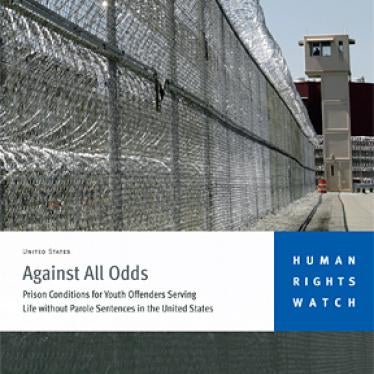On October 19, 2012, Human Rights Watch wrote to Governor Corbett and urged him to veto Senate Bill 850, which would maintain life without parole sentences as an option for child offenders.
The text of the letter is below.
--------
The Honorable Tom Corbett
Governor of Pennsylvania
Room 225
Main Capitol Building
Harrisburg, PA 17120
Re: Senate Bill 850 and Sentences for Youth Offenders
Dear Governor Corbett:
I write on behalf of Human Rights Watch to urge you to veto Pennsylvania Senate Bill 850, which would maintain life without parole sentences as an option for child offenders. The bill is contrary to the spirit of the US Supreme Court’s ruling in Miller v. Alabama (567 US ___ (2012)) and would codify excessive sentences for children that are inconsistent with international human rights law to which all US states are bound.
Senate Bill 850 (SB 850) is the product of a rushed legislative process with little input from experts and citizens. This flawed legislation, if signed into law, will open up Pennsylvania to extensive litigation. It will also show that Pennsylvania has chosen to ignore its responsibility to rehabilitate children who have committed criminal offenses.
SB 850 is flawed for the following reasons:
- It allows life sentences without the possibility of parole and other very lengthy sentences to be imposed on child offenders, even very young children. If SB 850 becomes law, Pennsylvania will be a state in which 12-year-old children can be sentenced to life without parole or life sentences where the first opportunity for review is after 25 years.
- It ignores that youth have a greater capacity for rehabilitation than older offenders.
- It ignores the racially disproportionate sentencing of youth in Pennsylvania. African American youth convicted of murder have been sentenced to life without parole in Pennsylvania at a much higher rate than white youth.
- It provides virtually zero public safety value at a very high cost. It will not provide a deterrent to future crime. Experts have shown that adolescents are unlikely to have the maturity and long-term rational thinking to be deterred by the prospect of a lengthy sentence.
In its Miller decision, the Supreme Court banned the mandatory application of the sentence of life without parole for children under the age of 18. In its decision, the Court stated that, “given all we have said … about children’s diminished culpability and heightened capacity for change, we think appropriate occasions for sentencing juveniles to this harshest possible penalty will be uncommon.” SB 850, however, would establish a new, excessively harsh sentencing structure for youth offenders. A 15-year-old sentenced for murder in Pennsylvania will only have a chance to be released at the age of 50—he will spend at least 35 years behind bars, more than twice his age at the time of his crime. Two-thirds of his life will be defined by life behind bars. SB 850 tosses aside any serious consideration of rehabilitation.
We note that the United States is party to the International Covenant on Civil and Political Rights, a treaty under which it commits to treating juvenile offenders differently than adults. In particular, the United Nations Human Rights Committee, which provides authoritative interpretation of the Covenant, has concluded that the Covenant requires criminal justice systems to take into account the youth of the offender and opportunities for rehabilitation. The Covenant’s provisions apply to state governments as well as the national government under a federal system.
There is no doubt that thoughtful, informed sentencing reform is needed in Pennsylvania. Senate Bill 850 is neither thoughtful nor sufficiently informed. If adopted, SB 850 will ensure that Pennsylvania continues to have the largest population in the country of young offenders serving life without parole sentences. We urge you to veto this legislation and to ask the Assembly to fully revisit this issue in the light of the Miller decision and of Pennsylvania’s international human rights obligations.
Sincerely,
Antonio Ginatta
US Program Advocacy Director
Human Rights Watch






